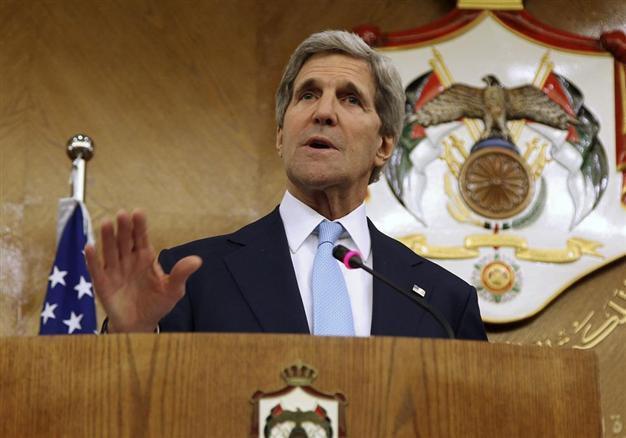Kerry pushes hard for US drive on Middle East
AMMAN / JERUSALEM

U.S. Secretary of State John Kerry speaks during a joint news conference with Jordan's Foreign Minister Nasser Judeh (not seen) at the Ministry of Foreign Affairs in Amman July 17, 2013. REUTERS/Muhammad Hamed
U.S. Secretary of State John Kerry is pushing hard to revive frozen Middle East negotiations between Israel and Palestine, extending his visit until today in a sign that talks will kick off soon.
Kerry cited significant progress in narrowing gaps between the two sides and decided to remain in Amman until today to determine if there is additional work that requires his presence.
But U.S. State Department spokeswoman Jen Psaki said there were no plans at the moment for an announcement on resuming peace talks between Israel and the Palestinians.
“There are currently no plans for an announcement for the resumption of negotiations,” Psaki said in Amman, where Kerry is on his sixth visit to the region to try to revive peace talks that broke down nearly three years ago.
Kerry met Palestinian President Mahmoud Abbas twice, representatives of the Arab League and nine of its members that support an Arab-Israeli peace plan proposed by Saudi Arabia and Jordanian officials.
In a statement after the meeting, the Arab delegation endorsed Kerry’s initiative, saying his ideas “constitute a good ground and suitable environment for restarting the negotiations, especially the new and important political, economic and security elements.” Kerry refused to discuss details of the proposals he laid out to the Arab officials or how the gap with the Israelis had narrowed.
The statement was significant because it could give Palestinian leader the political cover he would need to sell a return to negotiations to a skeptical Palestinian public. Abbas was meeting late July 18 with fellow Palestine Liberation Organization (PLO) leaders in Ramallah leadership to discuss the matter.
Kerry mentioned “very wide” and “very significant” gaps between Israelis and Palestinians that had prevented the two sides from restarting talks when his efforts began several months ago. “Through hard and deliberate, patient work, and most importantly through quiet work, we have been able to narrow those gaps very significantly,” he said. “We continue to get closer and I continue to remain hopeful that the sides will soon be able to come to sit at the same table.”
In a further sign of a possible breakthrough in Kerry’s intense diplomatic efforts, Israeli army radio said the military was preparing to lift some restrictions on Palestinian movement in the West Bank. “In the light of security assessments, two roads in the territories are expected shortly to be opened to Palestinian traffic; one north of Ramallah and one close to Beit Haggai,” the radio’s reported said, referring to a settlement near the southern West Bank city of Hebron.
However, the radio quoted the military spokesman’s office as saying the plans were a gesture for the Muslim fasting month of Ramadan and not linked to peace efforts.
Earlier in the day, an Israeli official said Jerusalem has agreed to a proposed formula for new peace talks with the Palestinians under which the border of their future state would be along lines that existed before the 1967 Middle East war, but with agreed land swaps. The official had said that if the Palestinians accepted the formula, Kerry could announce the relaunch of peace talks. However, Prime Minister Benjamin Netanyahu’s spokesman denied the claims, saying “the report is untrue.”
Bolstering the hopes, Israeli President Shimon Peres urged the EU to delay stopping the funding of projects involving settlements in the occupied territories as Palestinians and Israelis inch toward fresh peace talks.
“The coming days are critical,” his office quoted him as saying. “Wait with your decision, give priority to peace.”
The European Union is to publish new guidelines for its 28 member-states today that will block all funding of, or dealings with, Jewish settlements in the occupied West Bank, including annexed east Jerusalem. Peres said there were signs of progress in Kerry’s shuttle diplomacy.
“From the latest information at my disposal, Secretary of State John Kerry has succeeded in advancing the chances of renewing peace talks,” the statement quoted him as saying.
